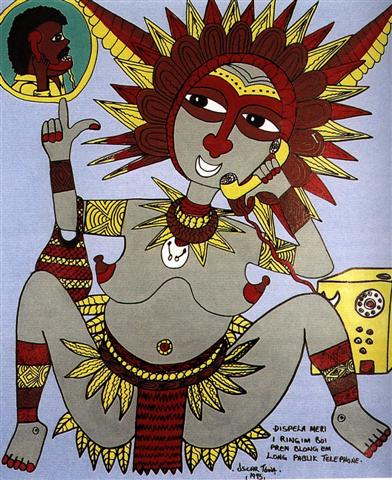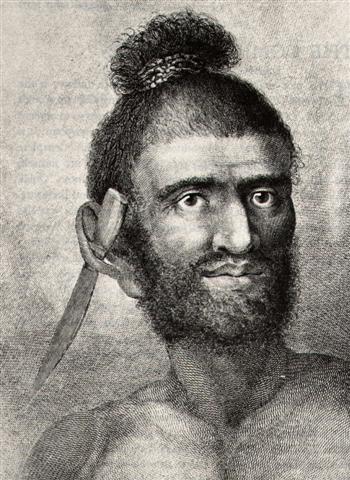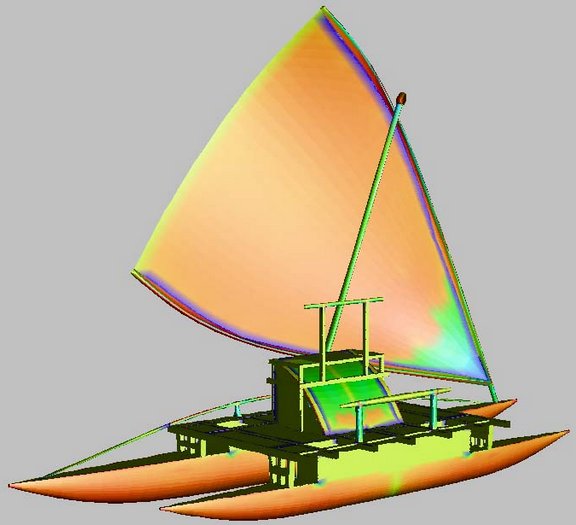There are 3 hanau glyphs which seem
to indicate the place where the Sun was being
reborn:
|
 |
 |

|
 |
|
hanau |
Ca3-6 |
Ca3-9 |
Ca3-14 |
|
Hanau. 1.
Race, ethnic group. Hanau
eepe, the thick-set race;
hanau momoko, the slender
race (these terms were
mistranslated as 'long-ears' and
'short-ears'). 2. To be born.
Hanau tama, pregnant woman;
vî'e hanau poki, midwive
(also: vî'e hakaa'u).
Vanaga. To be born; vie
hanau, midwife. P Pau.:
fanauga, child, descendant,
progeny. Mgv.: hanau, to
be born, to be brought into the
world. Mq.: fanau,
hanau, to be born, to lie
in, to bring into the world.
Ta.: fanau, to be born,
to lie in. Churchill. |

... In A Girl Rings her Boyfriend,
a woman who wears traditional dress,
including a fiber apron and feather
headdress, uses a payphone to talk
with her boyfriend. Closer
examination reveals her polished
nails and a bag that looks like a
striped bilum but is worn
like a Western-style handbag, signs
of her boldness that are just as
obvious as placing a telephone call
to a man. The displayed posture in
which she sits, often used to depict
female ancestors as images of
fecundity and prosperity, seems
incongrous, perhaps underscoring
Towa's perception of the
inappropriateness of her behavior
...
|
kiore ki te henua |
ihe tapamea |
e tagata mau toki ki te
henua |
e hokohuki mau ki te
matagi |
kiore i te henua |
 |
 |
 |
 |
 |
|
Ca3-4
(55) |
Ca3-5 |
Ca3-6 |
Ca3-7 |
Ca3-8 (59) |
|
Matagi.
Wind, air, breeze,
squall, tempest, rhumb. P
Pau.: matagi, the
air, wind. Mgv.: matagi,
wind. Mq.: metani,
metaki, wind, air. Ta.:
matai, wind.
Churchill. Tagi. To
cry, to weep, to moan;
tatagi, to cry much; to
cry loudly: he-tagi te
karaga; tagata rava, tagi
karaga, bawling,
vociferous person. Vanaga.
To cry, to bark, to mew, to
bawl, to whine, to ring, to
wail, to prattle, to weep,
lamentation, condolence, to
regret, to affect, to wish,
to will, to choose,
earnestness; tae tagi,
inhuman, insensible, to
refuse, to renounce; tagi
kiukiu, ring of a bell;
tagi rakerake,
to wish one ill; tagi
kore, indifferent;
manava tagi, to affect;
hakatagi, to cause to
weep, to make resound, to
ring; tagitagi, to
covet; tatagi, cry
mourning, grief,
lamentation, to groan, to
weep, to be affected, to
grow tender; tatagi
tahaga, inconsolable;
tatagihaga, friendship.
Churchill. |
|
CLOSE TO THE FULL MOON: |
|
Al Thurayya-27 (Many Little
Ones) /
Krittikā-3 (Nurses of
Kārttikeya) /
TAU-ONO (Six Stones)
ATIKS =
ο
Persei, RANA (Frog) =
δ
Eridani
(55.1),
CELAENO (16 Tauri), ELECTRA
(17), TAYGETA (19),
ν
Persei (55.3), MAIA (20),
ASTEROPE (21), MEROPE (23)
(55.6) |
Hairy Head-18 (Cockerel) /
Temennu-3 (Foundation Stone)
ALCYONE
(56.1),
PLEIONE (28 Tauri), ATLAS
(27 Tauri)
(56.3) |
MENKHIB (Next to the
Pleiades =
ζ
Persei
(57.6)
PORRIMA (γ Virginis) |
ZAURAK (Boat) = γ Eridani
(58.9) |
λ Tauri (59.3), ν Tauri
(59.9) |
|
CLOSE TO THE SUN: |
|
Nov 14 |
15 |
16 (320) |
17 |
18 |
|
π
Cor. Borealis,
UNUK ELHAIA (Necks of the
Serpents) =
λ
Serpentis
(238.1),
CHOW =
β
Serpentis
(238.6) |
κ
Serpentis (239.3),
δ
Cor. Borealis,
TIĀNRŪ =
μ
Serpentis
(239.5),
χ
Lupi, (239.6),
ω
Serpentis (239.7),
BA (= Pa) =
ε
Serpentis,
χ
Herculis (239.8).
κ
Cor.
Borealis, ρ Serpentis (239.9 |
λ
Librae (240.0),
β
Tr. Austr. (240.3),
κ
Tr. Austr. (240.4),
ρ
Scorpii (240.8)
*199.0 = *240.4 - *41.4 |
Iklīl al Jabhah-15 (Crown of
the Forehead) /
Anuradha-17 (Following
Rādhā) /
Room-4 (Hare)
ξ
Lupi,
λ
Cor. Bor.(241.1),
ZHENG =
γ
Serpentis,
θ
Librae (241.2),
VRISCHIKA =
π
Scorpii
(241.3),
ε
Cor.
Borealis (241.5),
DSCHUBBA
(Front of Forehead) = δ
Scorpii
(241.7), η Lupi (241.9) |
υ
Herculis (242.3),
ρ
Cor. Borealis (242.4),
ι
Cor. Borealis (242.5),
θ
Draconis (242.6),
ξ
Scorpii (242.7)
*201.0 = *242.4 - *41.4
SCHEDIR (Breast) α
Cassiopeiae |
| tapamea tagata kua iri |
ki te pa |
kua hua |
ki te kotiga |
 |
 |
 |
 |
| Ca3-9 |
Ca3-10 (61) |
Ca3-11 |
Ca3-12 (63) |
|
Iri. 1. To go up; to go in a boat on the sea (the surface of which gives the impression of going up from the coast): he-eke te tagata ki ruga ki te vaka, he-iri ki te Hakakaiga, the men boarded the boat and went up to Hakakainga. 2. Ka-iri ki puku toiri ka toiri. Obscure expression of an ancient curse. Vanaga. Iri-are, a seaweed. Vanaga.
In Japanese, I remember, deguchi was a door of exit
... The old year has to pass through the 'door' marked 'exit' (deguchi) and in symbolic writing we therefore find a sign saying: 'mountain upon mountain' (i.e. an extremely old person) and 'mouth':
 
while iriguchi was the entrance door.

Tariga pogeha, tariga pó, sordo.

| ARIES: |
| Ashvini wife of the Ashvins |
β and γ Arietis Sheratan and Mesarthim |
Horse's head |
April 17 (107) |
| Bharani the bearer |
35, 39, and 41 Arietis Musca Borealis |
Yoni, the female organ of reproduction |
May 1 (121) |
| TAURUS: |
| Krittikā the nurses of Kārttikeya |
M 45 Tauri The Pleiades |
Knife or spear |
May 15 (135) |
| Rohini the red one |
α Tauri Aldebaran |
Cart or chariot, temple, banyan tree |
May 28 (148) |
|
|
CLOSE TO THE FULL MOON: |
|
4h (60.9)
JĪSHUĬ = λ Persei (60.7)
COR CAROLI (α Canum Ven.) |
υ Persei (61.2) |
BEID (Egg) = ο¹ Eridani (62.2), μ Persei (62.8)
VINDEMIATRIX ( ε Virginis) |
Al Dabarān-2 (The Follower)
HYADUM I = γ Tauri (63.4)
*22.0 = *63.4 - *41.4 |
|
CLOSE TO THE SUN: |
| Nov 19 |
20 (324) |
21 |
22 |
|
16h (243.5)
ACRAB (Scorpion) = β Scorpii, JABHAT AL ACRAB (Forehead of the Scorpion) = ω Scorpii (243.3), θ Lupi, RUTILICUS = β Herculis (243.5), MARFIK (Elbow) = κ Herculis (243.7), φ Herculis (243.8) |
ψ Scorpii (244.6), LESATH (Sting) = ν Scorpii (244.8) |
χ Scorpii (245.1), YED PRIOR (Hand in Front) = δ Ophiuchi, δ Tr. Austr. (245.5) |
YED POSTERIOR (Hand Behind) = ε Ophiuchi, RUKBALGETHI SHEMALI (Northern Knee of the Giant) = τ Herculis (246.6). δ Apodis (246.7), ο Scorpii (246.8) |
| kiore i te henua |
tapamea - tagata hoi hatu |
ki te ariki |
kiore i te henua |
 |
 |
 |
 |
| Ca3-13 (64) |
Ca3-14 |
Ca3-15 |
Ca3-16 |
|
Hoki. To return, to go back, to
come back; ka hoki ki rá, go back there! ana oho koe ki
Hiva, e hoki mai ki nei, if you go to the mainland, do come back
here again. Vanaga. 1. Also, what; ki ra hoki, precisely
there; pei ra hoki, similitude, likeness; pei ra hoki ta
matou, usage. P Pau.: hokihoki, often. Mgv.: hoki,
also, and, likewise. Mq.: hoi, surely. Ta.: hoi, also,
likewise. 2. To return, to turn back, to draw back, to give back, to
tack; mau e hoki mai, to lend; hoki hakahou, to carry
back; hoki amuri, to retrograde; hakahoki, to bring
back, to send back, to carry back, to restore, to renew, to revoke,
to remove, to dismiss, to pay, to pardon, to compress; hakahokia,
given up; hakahokihaga, obligation. P Pau.: hokihoki,
to persist, to insist; fakahoki, to give back. Mgv.: hoki,
to return, to retrace one's steps; oki, to return, to come
back. Ta.: hoi, to return, to come back. Ta.: mahoi,
the essence or soul of a god. Churchill.
Hatu. 1. Clod of earth; cultivated land;
arable land (oone hatu). 2. Compact mass of other substances:
hatu matá, piece of obsidian. 3. Figuratively: manava
hatu, said of persons who, in adversity, stay composed and in
control of their behaviour and feelings. 4. To advise, to command.
He hatu i te vanaga rivariva ki te kio o poki ki ruga ki te
opata, they gave the refugees the good advice not to climb the
precipice; he hatu i te vanaga rakerake, to give bad advice.
5. To collude, to unite for a purpose, to concur. Mo hatu o te
tia o te nua, to agree on the price of a nua cape. 6.
Result, favourable outcome of an enterprise. He ká i te umu mo te
hatu o te aga, to light the earth oven for the successful
outcome of an enterprise. Vanaga. 1. Haatu, hahatu,
mahatu. To fold, to double, to plait, to braid; noho hatu,
to sit crosslegged; hoe hatu, clasp knife; hatuhatu,
to deform. 2. To recommend. Churchill. In the Polynesian dialects
proper, we find Patu and Patu-patu, 'stone', in New
Zealand; Fatu in Tahiti and Marquesas signifying 'Lord',
'Master', also 'Stone'; Haku in the Hawaiian means 'Lord',
'Master', while with the intensitive prefix Po it becomes
Pohaku, 'a stone'. Fornander. |
|
CLOSE TO THE FULL MOON: |
| HYADUM II = δ¹ Tauri (64.2) |
Net-19 (Crow)
AIN (Eye) = ε Tauri, θ¹ Tauri, θ² Tauri (65.7) |
No star listed (66) |
No star listed (67) |
|
CLOSE TO THE SUN: |
| Nov 23 (327) |
24 |
25 |
26 |
|
Heart-5 (Fox)
σ Scorpii (247.0), HEJIAN = γ Herculis (247.2), ψ Ophiuchi (247.7) |
ρ Ophiuchi (248.1), KAJAM (Club) = ω Herculis (248.3), χ Ophiuchi (248.5), SHE LOW (Market Tower) = υ Ophiuchi, Tr. Austr. (248.7), ζ Tr. Austr. (248.8) |
Al Kalb-16 (The Heart) / Jyeshtha-18 (Eldest) / ANA-MUA-1 (Entrance pillar)
ANTARES = α Scorpii (249.1), MARFIK (Elbow) = λ Ophiuchi, φ Ophiuchi (249.5), ω Ophiuchi (249.8) |
γ Apodis (250.1), σ Herculis (250.3), θ Tr. Austr. (250.6), τ Scorpii (250.7) |
... The
correspondence between the winter
solstice and the kali'i rite
of the Makahiki is arrived at
as follows: ideally, the second
ceremony of 'breaking the coconut',
when the priests assemble at the
temple to spot the rising of the
Pleiades, coincides with the full
moon (Hua tapu) of the
twelfth lunar month (Welehu). In
the latter eighteenth century, the
Pleiades appear at sunset on 18
November. Ten days later (28
November), the Lono effigy
sets off on its circuit, which lasts
twenty-three days, thus bringing the
god back for the climactic battle
with the king on 21 December, the
solstice (= Hawaiian 16 Makali'i). The
correspondence is 'ideal' and only
rarely achieved, since it depends on
the coincidence of the full moon and
the crepuscular rising of the
Pleiades ...
In my presentation above we will
find November 18 to be 4 days
earlier than what might be expected:
 |
 |
|
Nov 22 |
koti |
Koti. Kotikoti. To cut
with scissors (since this is an
old word and scissors do not
seem to have existed, it must
mean something of the kind).
Vanaga. Kotikoti. To
tear; kokoti, to cut, to
chop, to hew, to cleave, to
assassinate, to amputate, to
scar, to notch, to carve, to use
a knife, to cut off, to lop, to
gash, to mow, to saw;
kokotiga kore, indivisible;
kokotihaga, cutting, gash
furrow. P Pau.: koti, to
chop. Mgv.: kotikoti, to
cut, to cut into bands or
slices; kokoti, to cut,
to saw; akakotikoti, a
ray, a streak, a stripe, to make
bars. Mq.: koti, oti,
to cut, to divide. Ta.: oóti,
to cut, to carve; otióti,
to cut fine. Churchill. Pau.:
Koti, to gush, to spout.
Ta.: oti, to rebound, to
fall back. Kotika, cape,
headland. Ta.: otiá,
boundary, limit. Churchill.
This 4-day difference could have been correlated
with a
faulty recalibration of the
Julian calendar by the Pope
Gregory XIII:
... Gregory
dropped 10 days to bring the
calendar back into
synchronisation with the
seasons. Accordingly, when the
new calendar was put in use, the
error accumulated in the 13
centuries since the Council of
Nicaea was corrected by a
deletion of ten days. The Julian
calendar day Thursday, 4 October
1582 was followed by the first
day of the Gregorian calendar,
Friday, 15 October 1582 (the
cycle of weekdays was not
affected) ...
... When
Julius Caesar established his
calendar in 45 BC he set March
25 as the spring equinox. Since
a Julian year (365.25 days) is
slightly longer than an actual
year the calendar drifted with
respect to the equinox, such
that the equinox was occurring
on about 21 March in AD 300 and
by AD 1500 it had reached 11
March. This drift induced Pope
Gregory XIII to create a modern
Gregorian calendar. The Pope
wanted to restore the edicts
concerning the date of Easter of
the Council of Nicaea of AD 325.
(Incidentally, the date of
Easter itself is fixed by an
approximation of lunar cycles
used in the Hebraic calendar,
but according to the historian
Bede the English name 'Easter'
comes from a pagan celebration
by the Germanic tribes of the
vernal - spring - equinox.)
So the shift
in the date of the equinox that
occurred between the 4th and the
16th centuries was annulled with
the Gregorian calendar, but
nothing was done for the first
four centuries of the Julian
calendar. The days of 29
February of the years AD 100, AD
200, AD 300, and the day created
by the irregular application of
leap years between the
assassination of Caesar and the
decree of Augustus re-arranging
the calendar
in AD 8,
remained in effect. This moved
the equinox four days earlier
than in Caesar's time ...
... These '4
unneccessary leap days' (prior
to the Council of Nicaea) were
approximately equal in number to
the precessional distance in
time between the Pope and the
time of rongorongo. The
Gregorian calendar could
therefore be easily understood
by the Easter Islanders. The
Pope had created a 'crooked
calendar' but since his time the
precession had fixed it.
... Looking
forward, Taetagaloa is
right, the canoe is crooked. He
slices through all the lashings
of the canoe to straighten the
timbers. He realigns the
timbers. First he must again
position the supports, then
place the timbers correctly in
them, but Kuikava the son
of Likāvaka goes over and
stands upon one support. His
father Likāvaka rushes
right over and strikes his son
Kuikava with his adze.
Thus Kuikava dies.
Taetagaloa goes over at once
and brings the son of
Likāvaka, Kuikava,
back to life. Then he again
aligns the supports correctly
and helps Likāvaka in
building the canoe. Working
working it is finished
...

|
















